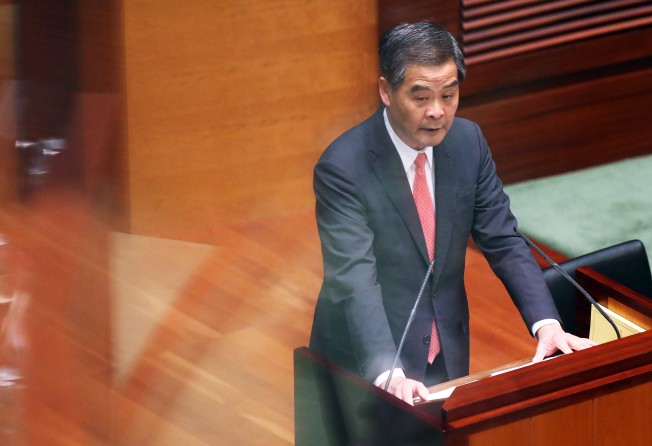Leung’s policy address ruffles few feathers – but won’t make him new friends either
The jury is still out on the chief executive’s ability to deal with Hong Kong’s social ills

It makes no sense for anyone who will seek re-election within the next 12 months to make new enemies. This may explain the chief executive’s preference for a “play-safe” strategy in his policy address in the Legislative Council on Wednesday.
Contrary to his usual indulgence in conflicts and adversity, Leung deliberately stayed away from major controversies in his speech. He made no attempt to attribute the political stalemate, social disorder, government failures or Hong Kong-mainland tension to the disruptive stance of the opposition.
There was no rhetoric in reiterating the primacy of the principle of “One Country” over “Two Systems”. There was simply a conspicuous lack of effort in placating hardliners in the local scene or high circles in the mainland during his two-hour presentation, a trick we have witnessed so often in the previous policy addresses.
There was even space to accommodate the concerns raised by the Opposition in his speech, e.g. collusive bidding in property maintenance and complaints against over-spending on mega-infrastructure projects.
The main target of Leung Chun-ying’s new image of moderation and restraint is, however, the business sector. The lack of enthusiasm emitted in the brief and mundane sentence on the issues of old-age pension reform and standard working hour legislation is certainly welcomed by employers.
And they will probably find much comfort in the government’s reticence on the issue of hedging between employees’ contributions to the Mandatory Provident Fund and severance pay. The main message is that the radicalism or anti-business stance of Leung Chun-ying is nothing more than a misunderstanding, or a thing of the past.
Unfortunately, it is unlikely that Leung can make many new friends with this speech either. The overall plan is to portray himself as a man who means business. He would like to redeem himself with a vision on the economic future of Hong Kong. Yet, his painstaking and unnecessarily tedious account on the potential roles of Hong Kong in the grand scheme of One Belt, One Road was at best uninspiring.
The lengthy depiction of the possible contribution of the special administrative region and the synergy between Hong Kong and mainland economy was bookish and boring, devoid of concrete policy measures or action plan.
The few piecemeal and disjointed measures suggested in the speech could hardly prepare Hong Kong for the colossal task described by the chief executive.
His pet project of Lantau development, on the other hand, won’t do much in rallying support for him either, as it is still nothing more than a concept with little substance.
Leung would certainly see the progress in housing supply in recent years as the trump card in recapturing social support for his administration. While few would question his determination and commitment to this cause, the rosy picture depicted here could hardly alleviate the general frustration with living conditions.
The harsh reality is private property is still beyond the budgets of most Hongkongers and there has been no substantial reduction in waiting times for public housing applicants. It is these indicators – not the lifeless statistics in supply – that matter most.
The jury is still out on Leung’s credentials as the one who can solve our many social and economic problems.
The policy address may not have done much harm to Leung’s popularity. Nor does it enhance his standing as the right person to take care of the administration beyond 2017 in the eyes of the general public.
Ray Yep, professor in Department of Public Policy
City University of Hong Kong